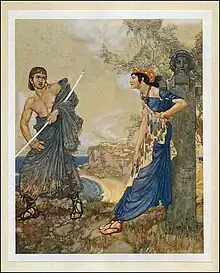Idyll XX
Idyll XX, also called Βουκολίσκος ('The Young Countryman'), is a bucolic poem doubtfully attributed to the 3rd century BC Greek poet Theocritus.[1] A neatherd, chafing because a city woman disdains him, protests that he is handsome, that Gods have been known to make love to country-folk, and that she deserves no lover at all.[1][2] For grammatical and other reasons, some critics consider this Idyll apocryphal.[3]
Summary
A herdsman, who had been contemptuously rejected by Eunica, a girl of the town, protests that he is beautiful, and that Eunica is prouder than Cybele, Selene, and Aphrodite, all of whom loved mortal herdsmen.[3] He calls down upon her the curse of perpetual celibacy.[1]
Analysis

This poem is a monologue, but includes dumb characters—the shepherds of line 19.[1] Stylistic considerations belie the tradition which ascribes it to Theocritus.[1][2]
See also
References
- Edmonds, ed. 1919, p. 237.
- Gow, ed. 1950, ii, p. 364.
- Lang, ed. 1880, p. 96.
Sources
- Gow, A. S. F., ed. (1950). Theocritus. Vol. 2. Cambridge: Cambridge University Press. pp. 364–8.
Attribution: ![]() This article incorporates text from these sources, which are in the public domain.
This article incorporates text from these sources, which are in the public domain.
- Edmonds, J. M., ed. (1919). The Greek Bucolic Poets (3rd ed.). William Heinemann. pp. 237–43.
- Lang, Andrew, ed. (1880). Theocritus, Bion, and Moschus. London: Macmillan and Co. pp. 96–8.
Further reading
- Cholmeley, R. J., ed. (1919). The Idylls of Theocritus (2nd ed.). London: G. Bell & Sons, Ltd. pp. 327–9.
- Gow, A. S. F., ed. (1950). Theocritus. Vol. 1. Cambridge: Cambridge University Press. pp. 149–51.
External links
 Greek Wikisource has original text related to this article: Βουκολίσκος
Greek Wikisource has original text related to this article: Βουκολίσκος- "Theocritus, Idylls, Βουκολίσκος". Perseus Digital Library.